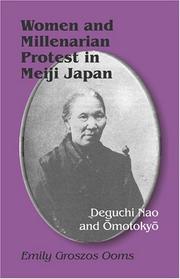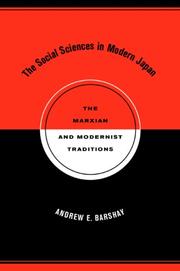| Listing 1 - 10 of 32 | << page >> |
Sort by
|

ISBN: 0824824393 0824823117 Year: 2001 Publisher: Honolulu University of Hawaii press
Abstract | Keywords | Export | Availability | Bookmark
 Loading...
Loading...Choose an application
- Reference Manager
- EndNote
- RefWorks (Direct export to RefWorks)
J4010 --- J4000.80 --- Protest movements --- Social movements --- Citizen participation --- Community action --- Community involvement --- Community participation --- Involvement, Community --- Mass political behavior --- Participation, Citizen --- Participation, Community --- Participation, Political --- Political activity --- Political behavior --- Political rights --- Social participation --- Political activists --- Politics, Practical --- Movements, Social --- Social history --- Social psychology --- Japan: Social sciences in general -- ideology, socio-political and socio-economic movements --- Japan: Social history, history of civilization -- Gendai (1926- ), Shōwa period, 20th century --- History --- -History --- -Japan --- Japan --- Social conditions --- -Political participation. --- -J4010 --- -Political participation --- Political participation. --- Political participation
Book
ISBN: 2716901309 Year: 1979 Publisher: Paris Publications orientalistes de France
Abstract | Keywords | Export | Availability | Bookmark
 Loading...
Loading...Choose an application
- Reference Manager
- EndNote
- RefWorks (Direct export to RefWorks)
Japan --- Japon --- Intellectual life --- Social life and customs --- Vie intellectuelle --- Moeurs et coutumes --- 32 -057.17 --- J4165 --- J4010 --- Elite. Invloedrijke personen. Leiders. Leiderschap. Politieke elite. Sociale beinvloeding --- Japan: Sociology and anthropology -- communities, social classes and groups -- scholars, students, intellectuals --- Japan: Social sciences in general -- ideology, socio-political and socio-economic movements --- 32 -057.17 Elite. Invloedrijke personen. Leiders. Leiderschap. Politieke elite. Sociale beinvloeding

ISSN: 10502955 ISBN: 0939657619 9780939657612 Year: 1993 Volume: 61 Publisher: Ithaca East Asia Program, Cornell University
Abstract | Keywords | Export | Availability | Bookmark
 Loading...
Loading...Choose an application
- Reference Manager
- EndNote
- RefWorks (Direct export to RefWorks)
J4176.80 --- J1914.82 --- J4000.70 --- J4010 --- Japan: Sociology and anthropology -- gender roles, women, feminism -- history --- Japan: Religion -- Shintō -- sects and schools -- new -- Ōmoto --- Japan: Social history, history of civilization -- Kindai (1850s- ), bakumatsu, Meiji, Taishō --- Japan: Social sciences in general -- ideology, socio-political and socio-economic movements
Book
ISBN: 9781597400831 1597400831 Year: 1963 Publisher: London Oxford university
Abstract | Keywords | Export | Availability | Bookmark
 Loading...
Loading...Choose an application
- Reference Manager
- EndNote
- RefWorks (Direct export to RefWorks)
JP / Japan - Japon --- 323.0 --- J4610 --- J4600.80 --- J4010 --- Binnenlandse politiek: algemeenheden. --- Japan: Politics and law -- theory, methodology and philosophy --- Japan: Politics and law -- history -- Gendai (1926- ), Shōwa period, 20th century --- Japan: Social sciences in general -- ideology, socio-political and socio-economic movements --- Binnenlandse politiek: algemeenheden --- Nationalism --- National characteristics, Japanese --- National characteristics, Japanese. --- Nationalism. --- Japan. --- Nationalism - Japan
Book
ISBN: 9780824839574 0824839579 Year: 2015 Publisher: Honolulu University of Hawaiʻi Press
Abstract | Keywords | Export | Availability | Bookmark
 Loading...
Loading...Choose an application
- Reference Manager
- EndNote
- RefWorks (Direct export to RefWorks)
Chaos and Cosmos of Kurosawa Tokiko is the story of a self described base-born nobody who tried to change the course of Japanese history. Kurosawa Tokiko (1806u1890), a commoner from rural Mito domain, was a poet, teacher, oracle, and political activist. In 1859 she embraced the xenophobic loyalist faction (known for the motto revere the emperor, expel the barbarians) and traveled to Kyoto to denounce the shoguns policies before the emperor. She was arrested for slander, taken to Edos infamous Tenmach? prison, and sentenced to banishment. In her later years, having crossed the Tokugawa-Meiji divide, Tokiko became an elementary school teacher and experienced firsthand the modernizing policies of the new government. After her death she was honored with court rank for her devotion to the loyalist cause. Tokikos story reflects not only some of the key moments in Japans transition to the modern era, but also some of its lesser-known aspects, thereby providing us with a broader narrative of the late-Tokugawa crisis, the collapse of the shogunate, and the rise of the Meiji state. The peculiar combination of no-nonsense single- mindedness and visionary flights of imagination evinced in her numerous diaries and poetry collections nuances our understanding of activism and political consciousness among rural non-elites by blurring the lines between the rational and the irrational, focus and folly. Tokikos use of prognostication and her appeals to cosmic forces point to the creative paths women have constructed to take part in political debates as well as the resourcefulness required to preserve ones identity in the face of changing times. In the early twentieth century, Tokiko was reimagined in the popular press and her story rewritten to offset fears about female autonomy and boost local and national agendas. These distorted and romanticized renditions offer compelling examples of the politicization of the past and of the extent to which present anxieties shape historical memory. That Tokiko was unimportant and her loyalist mission a failure is irrelevant. What is significant is that through her life story we are able to discern the ordinary individual in the midst of history. By putting an extra in the spotlight, The Chaos and Cosmos of Kurosawa Tokiko offers a new script for the drama that unfolded on the stage of late-Tokugawa and early Meiji history. --Provided by publisher.
Women political activists --- Political activists --- Kurosawa, Tokiko, --- Japan --- History --- J3367 --- J3372 --- J4010 --- J4000.70 --- Japan: History -- Kinsei, Edo period -- kaikoku and bakumatsu (1853-1867) --- Japan: History -- Kindai, modern -- Meiji period (1868-1912) -- Meiji restoration --- Japan: Social sciences in general -- ideology, socio-political and socio-economic movements --- Japan: Social history, history of civilization -- Kindai (1850s- ), bakumatsu, Meiji, Taishō --- Women political activists. --- 1600-1912. --- Japan.
Book
ISBN: 0860082385 9780860082385 Year: 1978 Publisher: Tokyo University of Tokyo press
Abstract | Keywords | Export | Availability | Bookmark
 Loading...
Loading...Choose an application
- Reference Manager
- EndNote
- RefWorks (Direct export to RefWorks)
Authority --- Japan --- Social conditions --- J4000.80 --- J4010 --- J4121 --- Political science --- Authoritarianism --- Consensus (Social sciences) --- Japan: Social history, history of civilization -- Gendai (1926- ), Shōwa period, 20th century --- Japan: Social sciences in general -- ideology, socio-political and socio-economic movements --- Japan: Sociology and anthropology -- leadership and loyalty --- Social conditions. --- Japan - Social conditions
Book
ISBN: 9781849045797 1849045798 184904919X 1849049181 Year: 2016 Publisher: London Hurst & Company
Abstract | Keywords | Export | Availability | Bookmark
 Loading...
Loading...Choose an application
- Reference Manager
- EndNote
- RefWorks (Direct export to RefWorks)
Protest movements --- Counterculture --- History --- Japan --- Social conditions --- Radicalism --- Extremism, Political --- Ideological extremism --- Political extremism --- Political science --- J4010 --- J4000.90 --- Japan: Social sciences in general -- ideology, socio-political and socio-economic movements --- Japan: Social history, history of civilization -- postwar Shōwa (1945- ), Heisei period (1989- ), contemporary

ISBN: 0520914376 0585101469 9780520914377 9780585101460 0520084217 9780520084216 Year: 1988 Publisher: Berkeley University of California Press
Abstract | Keywords | Export | Availability | Bookmark
 Loading...
Loading...Choose an application
- Reference Manager
- EndNote
- RefWorks (Direct export to RefWorks)
Women social reformers --- Radicalism --- Extremism, Political --- Ideological extremism --- Political extremism --- Political science --- Social reformers --- History --- Japan --- Social conditions --- J4000.80 --- J4010 --- J4176.80 --- Japan: Social history, history of civilization -- Gendai (1926- ), Shōwa period, 20th century --- Japan: Social sciences in general -- ideology, socio-political and socio-economic movements --- Japan: Sociology and anthropology -- gender roles, women, feminism -- history --- Social reform --- Role of --- Women
Book
ISBN: 0816667586 0816667594 1452946930 0816680124 9780816667581 9780816667598 Year: 2012 Publisher: Minneapolis University of Minnesota Press
Abstract | Keywords | Export | Availability | Bookmark
 Loading...
Loading...Choose an application
- Reference Manager
- EndNote
- RefWorks (Direct export to RefWorks)
The Japanese women's liberation movement uman ribu, which had its roots in the anti-American sentiment and anti-imperialism of the post-WWII period in Japan, used violence to get its message across. In this history of the movement, Shigematsu examines the contradictions, repressive tendencies, and power dynamics among feminist activists in Japan. She demonstrates how the dominant forms of feminist inquiry have minimized different forms of violence within and among feminist subjects, through the use of less visible forms of violence such as silencing, repression, and gatekeeping of who and what counts as a proper feminist subject. The book is illustrated with b&w historical photos from the early 1970s.
Feminism --- Women --- Social conditions --- Human females --- Wimmin --- Woman --- Womon --- Womyn --- Females --- Human beings --- Femininity --- J4176.80 --- J4010 --- J4000.90 --- Japan: Sociology and anthropology -- gender roles, women, feminism -- history --- Japan: Social sciences in general -- ideology, socio-political and socio-economic movements --- Japan: Social history, history of civilization -- postwar Shōwa (1945- ), Heisei period (1989- ), contemporary

ISBN: 9780520253810 0520253817 Year: 2007 Publisher: Berkeley University of California Press
Abstract | Keywords | Export | Availability | Bookmark
 Loading...
Loading...Choose an application
- Reference Manager
- EndNote
- RefWorks (Direct export to RefWorks)
This incisive intellectual history of Japanese social science from the 1890s to the present day considers the various forms of modernity that the processes of "development" or "rationalization" have engendered and the role social scientists have played in their emergence. Andrew E. Barshay argues that Japan, together with Germany and pre-revolutionary Russia, represented forms of developmental alienation from the Atlantic Rim symptomatic of late-emerging empires. Neither members nor colonies of the Atlantic Rim, these were independent national societies whose cultural self-image was nevertheless marked by a sense of difference. Barshay presents a historical overview of major Japanese trends and treats two of the most powerful streams of Japanese social science, one associated with Marxism, the other with Modernism (kindaishugi), whose most representative figure is the late Maruyama Masao. Demonstrating that a sense of developmental alienation shaped the thinking of social scientists in both streams, the author argues that they provided Japanese social science with moments of shared self-understanding.
J4010 --- J4011 --- J4600.70 --- J1008.70 --- Japan: Social sciences in general -- ideology, socio-political and socio-economic movements --- Japan: Social sciences in general -- left-wing socio-political and socio-economic movements --- Japan: Politics and law -- history -- Kindai (1850s- ), bakumatsu, Meiji, Taishō --- Japan: Philosophy -- history -- Kindai (1850s-1945), Bakumatsu, Meiji and Taishō --- Social sciences --- Intellectuals --- Socialism --- Democracy --- Political culture --- History --- Social sciences - Japan - History --- Intellectuals - Japan - History --- Socialism - Japan - History --- Democracy - Japan - History --- Political culture - Japan - History
| Listing 1 - 10 of 32 | << page >> |
Sort by
|

 Search
Search Feedback
Feedback About UniCat
About UniCat  Help
Help News
News